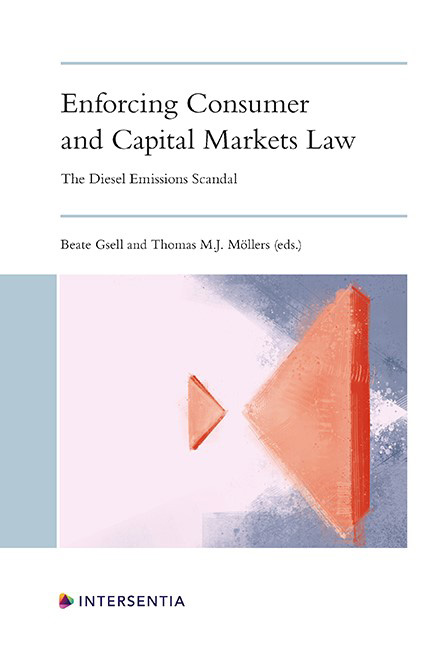Book contents
- Frontmatter
- Acknowledgement
- Contents
- List of Cases
- List of Abbreviations
- List of Contributors
- PART I INTRODUCTION
- PART II EUROPE
- PART II BEYOND EUROPE
- PART III THE SUPRANATIONAL PERSPECTIVE
- PART IV LEGAL PRACTICE PERSPECTIVE
- PART V INTRADISCIPLINARY ANALYSIS AND REFORM RECOMMENDATIONS
- Key Source Bibliography
- Index
- About the Editors
A Qualified Entities Comment on Consumer Law Enforcement
Published online by Cambridge University Press: 22 December 2020
- Frontmatter
- Acknowledgement
- Contents
- List of Cases
- List of Abbreviations
- List of Contributors
- PART I INTRODUCTION
- PART II EUROPE
- PART II BEYOND EUROPE
- PART III THE SUPRANATIONAL PERSPECTIVE
- PART IV LEGAL PRACTICE PERSPECTIVE
- PART V INTRADISCIPLINARY ANALYSIS AND REFORM RECOMMENDATIONS
- Key Source Bibliography
- Index
- About the Editors
Summary
INTRODUCTION
Before the Volkswagen emission scandal occurred, never had the discussion about consumer law enforcement in mass harm cases been as lively but also as wide-ranging as it is currently. It does not only affect Germany or the EU. It seems as if all over the world legal experts query their legal systems. For decades, the work of consumer associations was more or less disregarded by law firms. Since the declaratory model action (Musterfeststellungsklage) entered into force, Germany has been assailed with a veritable contest for ‘customers’’. Advertising messages meant to convince the consumers concerned to assign their claims, to engage a specific lawyer or to resort to a third-party funder are in many cases questionable: advertisements promising 100 per cent reimbursement within a very short time and without any risk, press conferences calling consumers to leave the Musterfeststellungsklage as this would certainly take years before coming to a result. The whole truth is that nobody could know at that stage what the outcome of the Musterfeststellungsklage would be and when it would end.
Unfortunately, the modus operandi of some players could have a counterproductive effect on the further development of legal instruments, which had just accelerated after decades of stagnation. Yet, there is more than enough work to do and the means the different players offer complement each other. Before explaining this complementarity, it is useful to explore the origin, the substance and the shortcomings of the enforcement rights of consumer organisations.
THE LEGAL STANDING OF CONSUMER ORGANISATIONS IN GERMANY
In Germany, individual consumers cannot file for injunctions under the unfair competition act. Since 1965, their interests have been represented by so-called qualified entities, which have the right to launch proceedings. Organisations applying for the inclusion in the official list of qualified entities must satisfy the legal prerequisites and be able to guarantee proper performance of the task. One prerequisite is that the organisation has qualified staff able to advise consumers. The organisation must also have sufficient financial resources. In the case of consumer organisations such as the consumer associations and vzbv, which receive public funding, it is assumed that they satisfy the necessary prerequisites for the right to take action.
The enforcement rights of consumer organisations in Germany have been extended over the last decades.
- Type
- Chapter
- Information
- Enforcing Consumer and Capital Markets LawThe Diesel Emissions Scandal, pp. 439 - 448Publisher: IntersentiaPrint publication year: 2020

